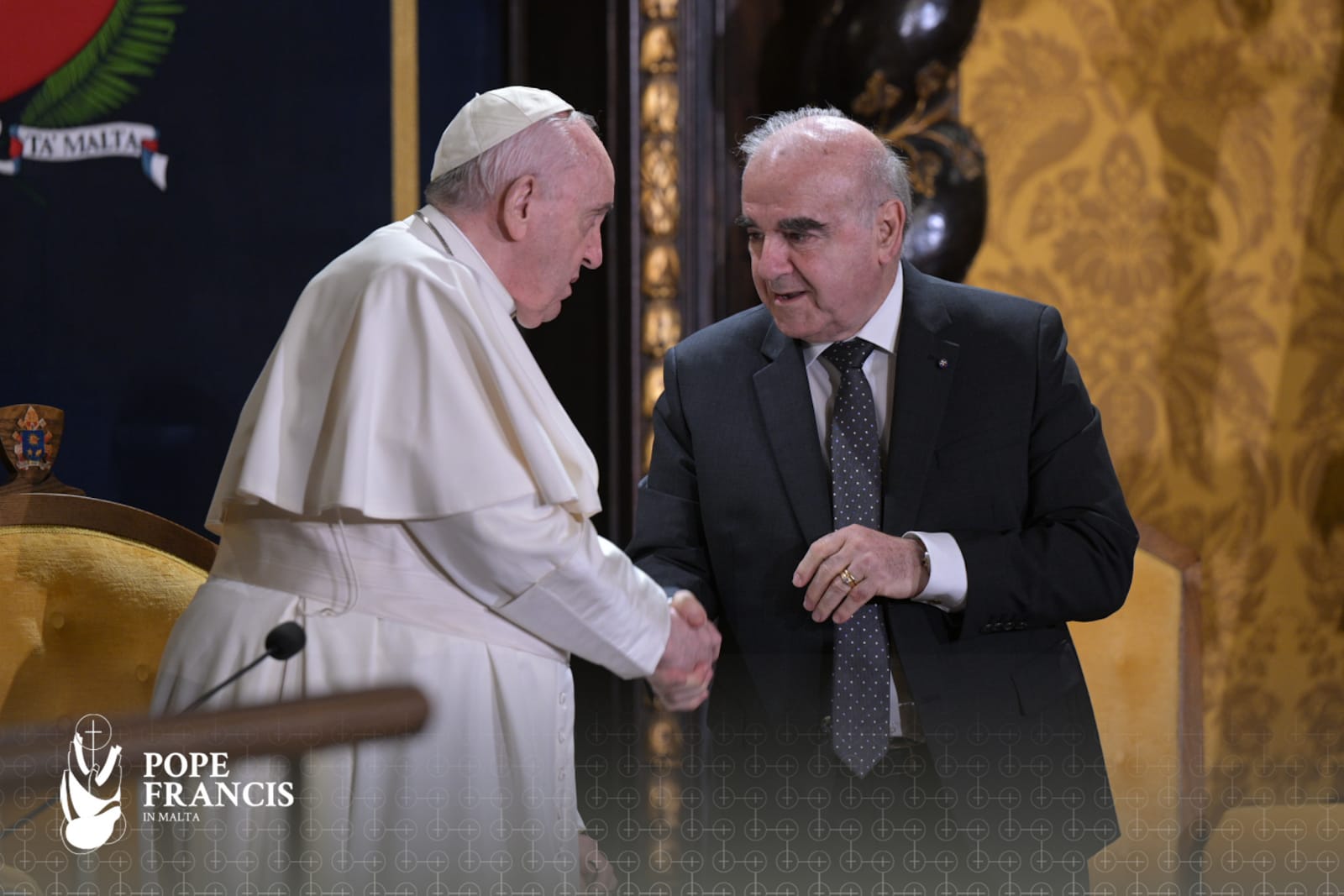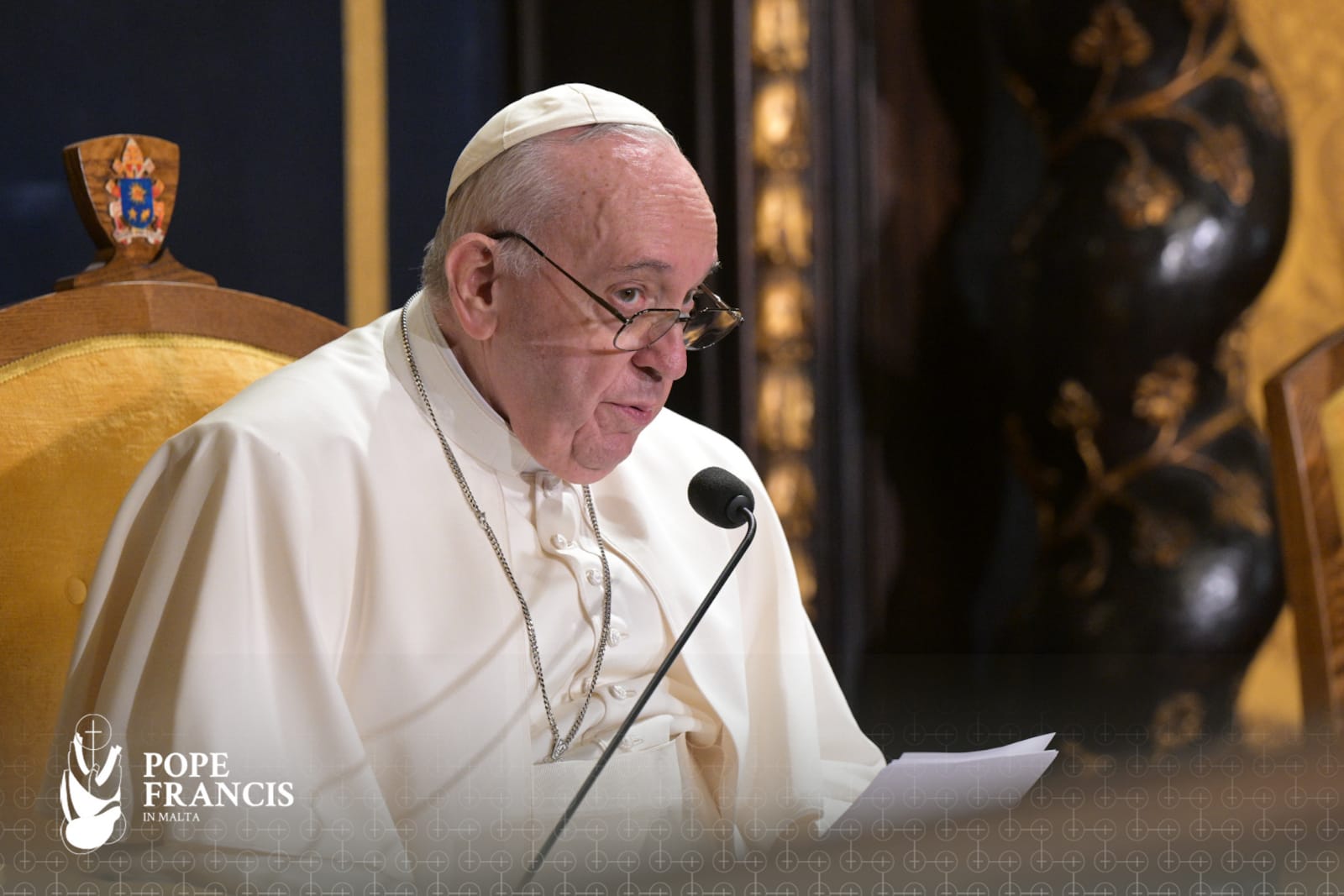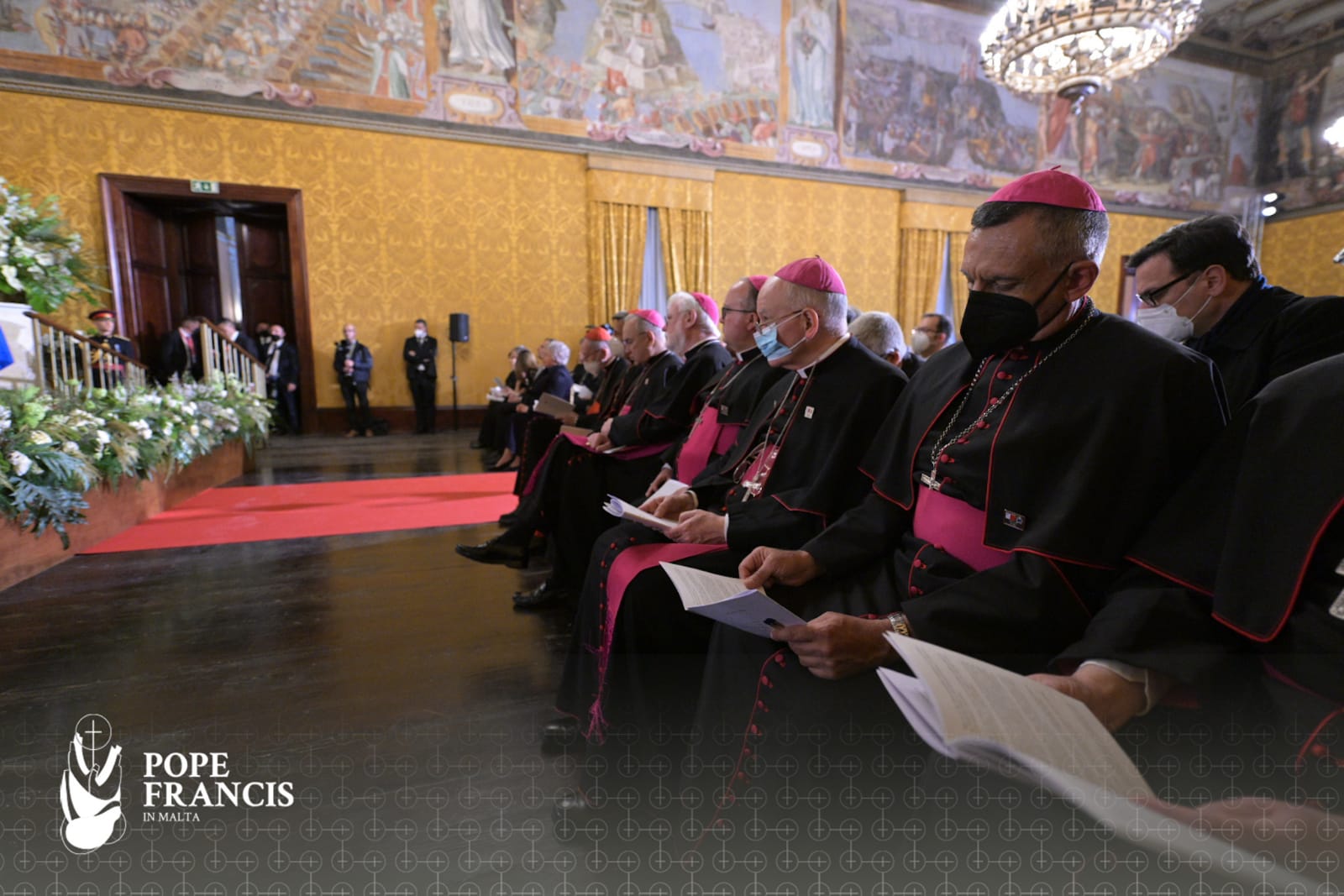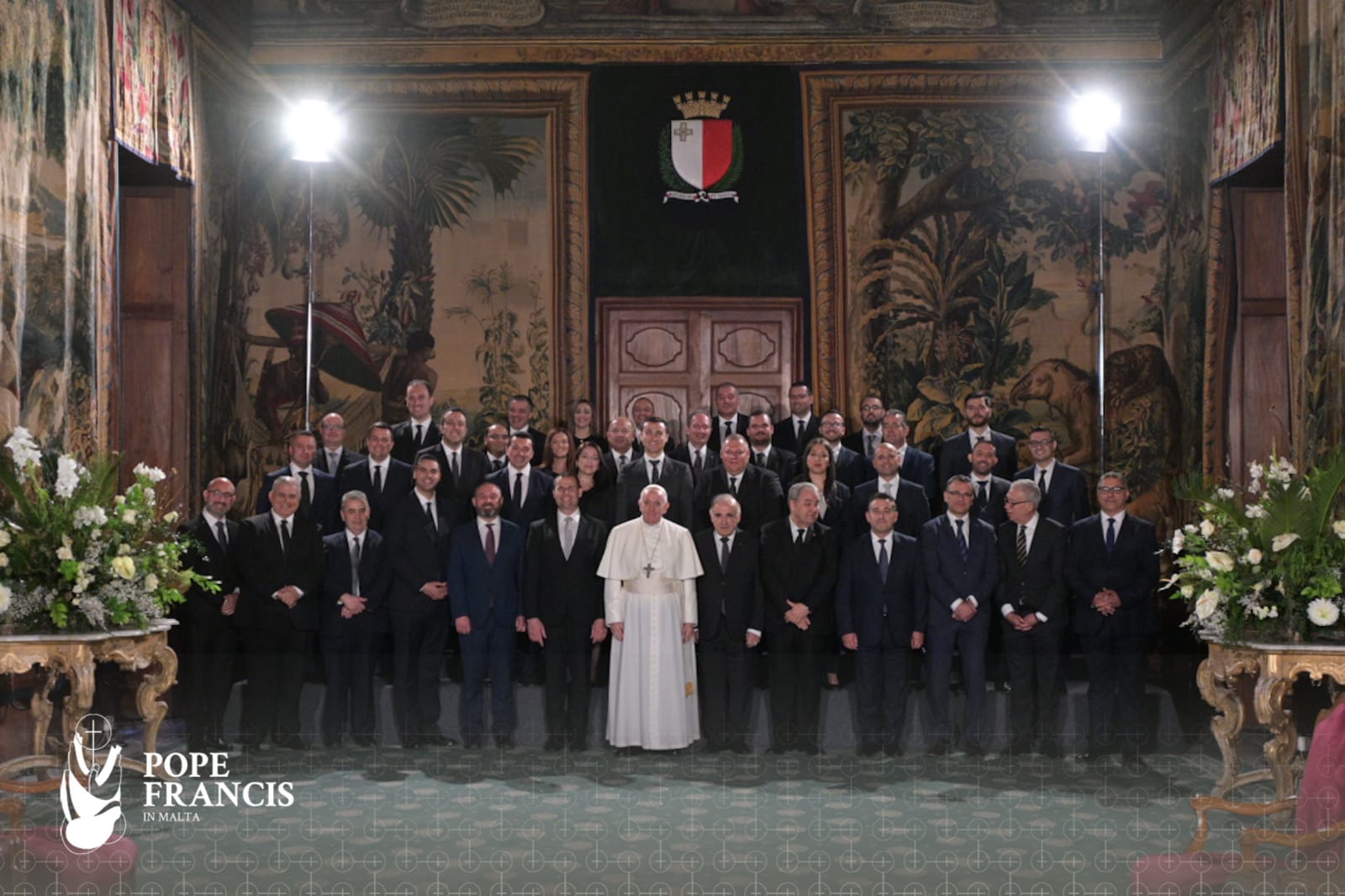Speech by President of Malta Dr George Vella on the occasion of the State Visit by Pope Francis
His Holiness Pope Francis
Honourable Prime Minister
President of the House of Representatives
His Grace Monsignor Archbishop
His Honour The Chief Justice
Honourable Ministers
Honourable Leader of the Opposition
Colleagues Presidents Emeriti
Excellencies
Distinguished Guests
Most Holy Father,
I am humbled and fortunate in welcoming you on behalf of the Government and people of Malta.
This is a long-awaited visit, which we all have been anxiously waiting for.
It comes as a further consolidation of the very close, historic relations between Malta and the Holy See, which over time have gone from strength to strength.
I recall vividly that we had mentioned the possibility of a visit by Your Holiness to Malta as early as September 2019, when you welcomed me at the Vatican and then again when you came to speak to me following the Mass for the repose of the soul of His Eminence Cardinal Prospero Grech in January 2020.
On both occasions, I was very touched by your interest in Malta, the regional challenges that surround our islands, and above all, by your personal appreciation of the qualities and values that distinguish us Maltese. The sentiments extolling these same virtues were expressed by Your Holiness in various General Audiences.

So many things have changed since these meetings.
The international community was shaken to its core by a pandemic that is still wreaking havoc on our health and economies, and which is teaching us lessons in human solidarity, which we should never forget.
It has taught us that we evidently need to work harder to strengthen global social justice, most importantly the sharing of resources, be they human or material.
Huge disparities continue to prevail, not only on the economic level, in the access to basic health and medical needs – starting off with vaccines, but also in relation to employment, education, mobility, human rights, freedom of expression and democracy.
We need to think of, and collectively adopt, new and higher standards of global solidarity that do away with individualism, isolation, populism, ostracism, and xenophobia.
A further shock to the international political system, and to all of us individually, came with the horrible and atrocious war in Ukraine.
Seventy-five years following World War Two, Europe is tragically witnessing a dreadful war and the spilling of blood on its soil once more.
The indiscriminate attacks on innocent lives, resulting in deaths, uprooting and displacement, are episodes the world believed it would never see again in Europe.
This is not because we have forgotten our history.
It is because war and everything connected to it, is unacceptable by modern standards and unthinkable even, in this day and age; even though we have almost become complacent to the long years of war and destruction in Yemen, Rwanda, Syria and other countries around the globe.
This war in Ukraine has brought out the worst and the best of humanity.
Against a backdrop of unprovoked destruction and desperation, we are seeing unity, we are seeing empathy and also a sense of solidarity amongst nations; something we had not experienced in generations.
I join Your Holiness, in your consistent and repeated appeals for the immediate cessation of these horrendous attacks as we continue to provide all the required assistance to the most vulnerable victims of this war.

We need to reflect on what kind of legacy we want to leave behind us for future generations.
Unfortunately, we are all absorbed with war and destruction when our undivided attention should be elsewhere.
Holy Father,
Our planet is sick, angry, and tired.
Yet we keep ignoring its manifest signs of environmental degradation, climate change and exploitation of its resources.
Are we giving enough attention to the manifest signals that the planet is sending us, or do we need more convincing evidence that both the human and natural environment are increasingly deteriorating at an alarmingly fast pace?
We cannot ignore the fact that the human and natural environment are intrinsically interlinked.
A viable and sustainable ecology can only be one that preserves and nurtures the human, social and environmental dimensions.
Despite several initiatives, all good intentions and repeated promises, we are a far cry from achieving our environment and development goals. It defies reason why humanity remains intent on destroying or replacing nature’s beauty with its own creations.
Commitments on sustainability are easy to pronounce but difficult to achieve and maintain.
As I have already stated, conflicts prevail and persist all around us in this global village, and we are tempted somehow to turn a blind eye, if not openly justify their existence.
The temptation to ignore them or to look elsewhere is very strong.
It could be because of our own interests and ambitions; it could be because of the weaknesses in regulatory mechanisms meant to address them at local, regional and international levels; or because of worrying double standards applied discriminately.
The common denominator to all conflicts remains the proliferation and sales of armaments, weapons and ammunition. This is, as has been repeatedly emphasised by Your Holiness, the bread and butter of the armaments industry, on which thrive whole national economies.
We see this taking place, in our immediate neighbourhood, the Mediterranean, but even further afield in the long-drawn crises of Syria and Yemen, already referred to.

In our region, and across the globe, in full agreement with Your Holiness, I would like to see less proliferation of weapons and ammunition, less commercialisation and a cessation to the arms race that only leads to protracted violence, division, humanitarian crises, fleeing from conflict zones, as well as deaths resulting from the inability of food and medicines to arrive at conflict zones.
Rest assured, Holy Father, that Malta will continue to fulfil its principled mission of promoting dialogue and mutual respect between the countries, cultures and religions that make our shared Mediterranean Sea a unique one.
Building peace is still Malta’s vocation, and we will not relent on our determination to continue working in this direction.
We will continue to actively seek a humane, just, and equitable solution to the issue of irregular migration.
Holy Father,
We know how deeply you feel about this issue, and we all feel your pain and disillusionment whenever dead bodies are washed on our shores and when migrants arrive in pitiful situations – if they make it at all.
Malta has never shied away from its commitments and obligations to save lives.
We have done this, and we will continue to do it.
However, considering our size and carrying capacity, we continue to ask for solidarity, from other countries that are not on the frontline, but have the resources, the opportunities and the potential to welcome migrants.
Documents, action plans and negotiated policies will lead nowhere unless there is the political will to act and to implement what is agreed upon.
In this context, allow me Holy Father, to underline our appreciation of the theme that has been identified to commemorate your visit, ‘They showed us unusual kindness’ lifted from the Acts of the Apostles.
May I recall the immense work which the Ecclesial community has carried out throughout our history and is still doing throughout its institutions and parishes.
This kindness, we will continue to spread and live up to, as a nation, when responding to the suffering of others.
We are presently doing this in the actions taken by the Government and people of Malta in support of our Ukrainian brethren, through the provision of humanitarian aid and the attention given to their sick children.
Holy Father,
It is not my intention to labour your visit only with these pressing concerns, which we continue to address both as an independent country but also with our partners as active members of the international community.
With these problems, I will therefore also dare to mention some possible solutions.
I need not search far and long for them.
We can all benefit from the ample wisdom contained in the inspiring writings that Your Holiness imparts with the world on a regular basis.
I have in mind documents like Fratelli Tutti, Laudato Sì, and the Document on Human Fraternity for World Peace and Living Together, to mention a few.
I also find encouragement, indeed solace – when I read your message for the World Peace Day in January of this year with its clear policies for the achievement of peace – decrying war and conflict, individualism, and environmental degradation.

We have to turn the page.
We can begin by regaining mutual trust by speaking more to one another.
We can start with more inter-generational exchanges and dialogue.
We need to fortify the nexus between, education, teaching and peace.
And we need to safeguard dignified work as the foundation of justice and solidarity.
We should also better value the role of women in all societies and increasingly place our youth at the helm of positive change and at the heart of peaceful co-existence.
This is a journey we need to walk together. This is what lies behind your promotion of the concept of Synodality.We need to create and invest our energies in a universal and inclusive process in which everyone’s voice is heard, and in which there is the widest possible participation.
Above all, Your Holiness, Malta will remain faithful to the pledge of looking after the most vulnerable in our community – those who are alone, those who are weakened by physical and psychological pain, those who feel unwanted, and those who are forced to suffer in silence.
Finally, we should above all respect the sanctity of life, from its beginning to its natural end.
Santità, għażiż missierna Franġisku
Inroddulek kull ħajr talli ġejt iżżurna, u nagħtuk l-akbar merħba f’dawn il-gżejjer li tant jgħożżuk.
Inwegħduk li permezz tal-miġja tiegħek fostna, ser inkomplu ningħaqdu bejnietna u nħabirku għall-paċi madwarna.
Fuq kollox inwegħduk li ser tibqa’ dejjem fi ħsibijietna, u kif dejjem tħeġġiġna nagħmlu, ser inkomplu nitolbu għalik
